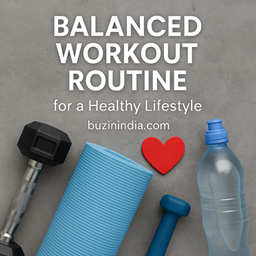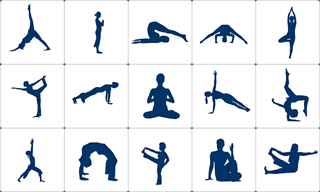Staying active is a key pillar of a healthy lifestyle, but simply hitting the gym isn’t enough. A balanced workout routine is essential to improve your overall health, prevent injury, and keep your motivation high. Whether you’re a beginner or looking to upgrade your current plan, here’s a guide to designing a well-rounded fitness routine that works for you.

Table of Contents
💪 Why a Balanced Workout Matters
Many people focus on one form of exercise—like cardio or weight training—but true fitness involves multiple components:
- Strength
- Endurance
- Flexibility
- Balance
- Recovery
Incorporating each element creates a synergy that supports heart health, builds muscle, prevents burnout, and boosts mental well-being.
🧱 1. Start with a Goal
Before designing your plan, ask yourself:
- Do I want to lose weight?
- Build strength or muscle?
- Improve flexibility or mobility?
- Reduce stress and feel more energized?
Your goal shapes the intensity, duration, and frequency of your workouts.
📝 Tip: Write down your goals to stay committed and track your progress.
🕒 2. Decide Your Weekly Schedule

A solid weekly structure might look like this:
| Day | Activity |
| Monday | Strength Training (Upper Body) |
| Tuesday | Cardio (e.g., jogging, cycling) |
| Wednesday | Yoga or Active Recovery |
| Thursday | Strength Training (Lower Body) |
| Friday | HIIT or Functional Training |
| Saturday | Light Cardio + Stretching |
| Sunday | Rest or Meditation |
🔁 Consistency is key—start small (3–4 days a week) and scale up.
🏋️♂️ 3. Include Strength Training
Strength workouts help build muscle, boost metabolism, and improve posture. Focus on:
- Compound movements like squats, lunges, push-ups, and rows
- Use bodyweight, resistance bands, or dumbbells
- 2–3 sessions a week are enough for beginners
💡 Aim for 8–12 reps per set, targeting all major muscle groups.
🏃♀️ 4. Don’t Skip Cardio
Cardio improves your heart health, endurance, and aids fat loss. Choose from:
- Brisk walking
- Jogging or running
- Cycling
- Swimming
- Dancing
⏱️ Try 150 minutes of moderate-intensity or 75 minutes of high-intensity cardio per week.
🧘 5. Stretch and Strengthen Flexibility
Flexibility and mobility reduce injury risk and support muscle recovery.
Incorporate:
- Yoga 🧘
- Pilates
- Dynamic and static stretching
🌅 Even 10–15 minutes after your workout can make a big difference.

⚖️ 6. Balance and Core Work
Training your core and balance improves posture and supports all movement.
Effective exercises:
- Planks
- Bird-dogs
- Single-leg stands
- Stability ball routines
🤸 Add core work 2–3 times a week.
💤 7. Prioritize Rest and Recovery
Rest days are just as important as workout days. They allow your muscles to rebuild and your body to recharge.
- Get 7–9 hours of quality sleep
- Stay hydrated and eat balanced meals
- Consider foam rolling or light walks on rest days
🌿 Recovery prevents burnout and supports long-term consistency.
🥗 Bonus: Pair It with a Healthy Diet
Fuel your body with:
- Lean proteins (chicken, tofu, dal)
- Complex carbs (brown rice, oats, quinoa)
- Healthy fats (nuts, olive oil)
- Hydration (2–3 litres of water daily)
🥦 Nutrition + exercise = sustainable wellness.

✅ Final Thoughts
Creating a balanced workout routine doesn’t require fancy equipment or expensive memberships. The key lies in variety, consistency, and listening to your body. By incorporating strength, cardio, flexibility, balance, and rest into your week, you’ll be on the path to a healthier, more energized life.
The Importance of Self-Care: Prioritizing Your Mental Health with small steps.

6fumig
машина changan https://changan-v-spb.ru